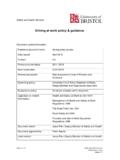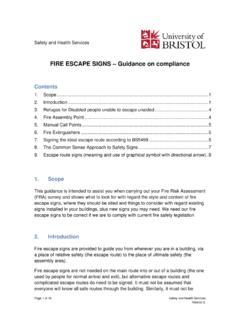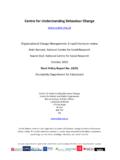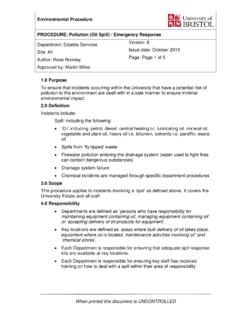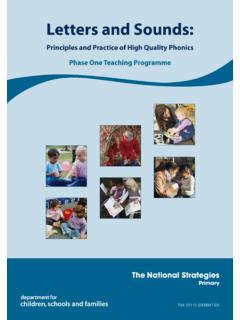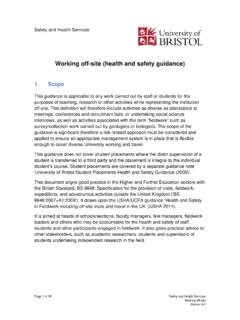Transcription of E-mail Etiquette - University of Bristol
1 E-mail Etiquette It is now commonplace for academic and administrative staff to communicate regularly with students by e-mails and to accept this as a natural means by which students can contact them for information, advice or requests for a face-to-face meeting. More generally, the question of how to write e-mails and what register to use has become an increasingly urgent concern amongst graduate recruiters and University lecturers. Writing e-mails in and for the workplace requires a different register to that used when e-mailing or messaging friends, and it is important to develop good practice before graduating.
2 E-mails which indicate professionalism and poise are bound to leave a good impression and get a quicker, more thorough response: e-mails which suggest ignorance, carelessness or lack of foresight will alienate the recipient and are likely to be less effective. Because your correspondence says a lot about you both personally and professionally, we ask our students to pay attention to the following guidelines when writing to staff. Starting & signing off your e-mails Do pay attention to the recipient s name and title (including the spelling of names). For a University , these include: Prof (for staff who hold Chairs in their field); Dr (for staff with PhDs); Mr; Miss / Ms; Mrs.
3 Getting such details correct suggests that you have not rushed the E-mail off. These details are easy to check via the School website. Don t address someone by their first name unless you are on quite familiar terms with them. Usually, if someone signs off with both their first and family names, this is an indication of formality, and you should reply by addressing that person with their title and surname. If someone signs off with just their first name, they are probably inviting you to call them by their first name, but if in any doubt, use the more formal form of address, or begin with Dear John (if I may) . Do open with a polite address, Dear Dr Smith , Dear John , etc.
4 Don t begin e-mails with overly familiar or bizarre-sounding openers, Hey John , Dear Dr John Smith (makes your addressee sound like a department ), Hiya You , John Smith, hello , etc. Do include a brief signature (including your degree programme and year of study) on your e-mails to help the recipient understand who it is from, especially if the person is unknown to you. Don t sign off in an overly familiar way, Jonno-Boy , Jonno xx , Mwah .. Overall Tone & Manner Do be polite and respectful, and use good judgement. Don t send e-mails that sound curt, abusive, or demanding, or make unnecessarily personal remarks.
5 Do be patient and allow around three working days for a response (any urgent matters may well require a phone call); vacation periods may require more time, although staff continue to work full time during the vacations with their research and administrative commitments. Don t bombard your addressee with e-mails, especially at weekends when members of staff will be out of their office. Do think about the message s content before you send it out: ask yourself if the answer to your question involves information that could be found online or in the SML / Departmental Handbooks.
6 Don t fire off e-mails without any structure, as this makes a message difficult to follow. Keep punctuation clear and spelling sound (including a capital I for the word I!), avoid shorthand, and use paragraphs to separate your points. Finally, always reread your message before hitting the send button. Do make sure that the content is relevant to the recipients and ensure that it is clearly identified in the subject line. Don t reply to an old message in order to raise a completely different topic: it will be less confusing to begin a new thread with its own subject line. Don t send off an E-mail to the first member of staff who comes into your head: whilst that person may be known to you, they may not be the best person to contact for you to get the most appropriate response.
7
